|
|
|
Sort Order |
|
|
|
Items / Page
|
|
|
|
|
|
|
| Srl | Item |
| 1 |
ID:
065951
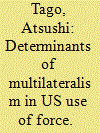

|
|
|
| 2 |
ID:
143279
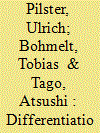

|
|
|
|
|
| Summary/Abstract |
Which factors drive the onset of genocidal violence? While the previous literature identified several important influences, states’ military capabilities for conducting mass-killings and the structure of their security forces have received surprisingly little attention so far. The authors take this shortcoming as a motivation for their research. A theoretical framework is developed, which argues that more differentiated security forces, that is, forces that are composed of a higher number of independent paramilitary and military organizations, are likely to act as a restraint factor in the process leading to state-sponsored mass-killings. Quantitative analyses support the argument for a sample of state-failure years for 1971–2003, and it is also shown that considering a state’s security force structure improves our ability to forecast genocides.
|
|
|
|
|
|
|
|
|
|
|
|
|
|
|
|
| 3 |
ID:
093598


|
|
|
|
|
| Publication |
2010.
|
| Summary/Abstract |
This article aims to demonstrate that differences in the two major datasets can significantly affect the results of predictions of mass political killing. Mass political killing (such as Hitler's killing of some six million Jews, or the Rwanda genocide of 1994) has been studied for decades with the aid of valuable datasets measuring 'democide' and 'genocide and politicide', respectively. Without attempting to take sides as to whether one or the other is a more valid measure of the phenomenon of mass political killing, the authors aim in this investigation to see what independent variables best account for the onset of mass political killing, with the state-year as the unit of analysis. The predictor variables are level of economic development; types of war and violent unrest short of war; and regime type. By using a Cox proportional hazard model, the authors find that important regime effects either appear or disappear depending on the dataset used, with regime generally having a significant effect on onset of democide, but not having a significant effect on onset of geno-politicide. It is important for the scholarly community to be aware of these dataset effects, which may be the source of some of the most important existing controversies in the literature on explaining mass political killing.
|
|
|
|
|
|
|
|
|
|
|
|
|
|
|
|
| 4 |
ID:
083222


|
|
|
|
|
| Publication |
2008.
|
| Summary/Abstract |
There is an empirical evidence of an aid-for-policy deal between the United States and other states; the United States has utilized aid programs to promote affirmative votes in the UN General Assembly and to maintain an alliance relationship with strategically important states. However, whether there is a systematic evidence of an aid-for-participation deal remains inconclusive. Does the United States generally utilize its foreign aid to reward the contribution of troops to the US-led multinational forces and to punish the lack of contribution? The author argues that US foreign aid is used to prevent free-riding in coalition participation. To test the argument, I examined whether states were punished or rewarded by the United States for their behavior in sending or failing to send troops to 15 post-Second World War US-led coalition forces. The results show that the United States punished states for unexpected nonparticipation, but did not always provide rewards for support
|
|
|
|
|
|
|
|
|
|
|
|
|
|
|
|
| 5 |
ID:
156243
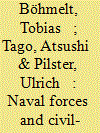

|
|
|
|
|
| Summary/Abstract |
While the importance of navies for international affairs is widely documented, their influence in domestic politics remains less understood. This research offers a comparative account of how states’ naval forces affect civil-military relations. Does the navy matter for military attempts to seize government power? Urban populations, especially middle class elements in the capital city, are more capable (if willing) of creating opportunities for the armed forces to overthrow the government. Recruitment practices and the location of bases often link naval forces more strongly to these societal elements. Thus, countries with a larger navy in relation to the army could be more vulnerable to a coup d’état. The empirical findings, based on the analysis of time-series cross-section data on a sample of all states between 1970 and 2007, provide strong support for this proposition. Several robustness checks further increase our confidence in the results.
|
|
|
|
|
|
|
|
|
|
|
|
|
|
|
|
| 6 |
ID:
166001


|
|
|
|
|
| Summary/Abstract |
Authorization of the use of force by the United Nations Security Council (UNSC) is believed to increase levels of public support for military action. While scholars have performed sterling research both in theory and empirics on the power of UNSC authorization, there is still much that we do not understand. In particular, we believe that it is necessary to conduct a further study on ‘failed’ authorization cases. As Terrence Chapman points out in his theoretical framework, the general public can derive valuable information based on which of the permanent members of the Council casts a veto; this in turn affects public attitudes towards the use of force. An expected veto cast by the perpetual nay-sayer would not serve as information for the general public. However, if the veto is cast by an allied state of a proposer of the authorizing resolution, the negative vote functions as an information short-cut signaling that the use of force presents a variety of problems, thus reducing public support for the military action. Using online survey experiments, we find supportive evidence for this argument. Our data also suggest that surprising negative information changes the perceptions of legitimacy, legality, public goods, and US interest in a proposed military action, but is unrelated to the perception of costs, casualties or duration.
|
|
|
|
|
|
|
|
|
|
|
|
|
|
|
|
| 7 |
ID:
121246
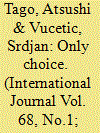

|
|
|
|
|
| Publication |
2013.
|
| Summary/Abstract |
The United States has two faithful allies in Canada and Japan. Established at
different points in the twentieth century, the two alliances have grown and
flourished, helping to maintain an American-led order in the Asia-Pacific
and beyond. By any reasonable measure, few states are as integrated in
the American security sphere as these two. In David A. Lake's index of US
"security hierarchy," which measures a variety of bargaining mechanisms
through which states voluntarily trade autonomy and sovereignty for order,
prosperity, and cheaper security provided by the US, Japan ranks fifth and Canada eighth.1
From this perspective, it is not surprising that Japan and
Canada are participating in the F-35 Joint Strike Fighter (JSF) program.
|
|
|
|
|
|
|
|
|
|
|
|
|
|
|
|
| 8 |
ID:
145725
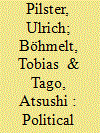

|
|
|
|
|
| Summary/Abstract |
Several studies have claimed that changes in the political leadership of a country affect foreign policy decision making. The following paper systematically tests this in the context of states' participation in military coalition operations. By building on previous theoretical models, the authors argue that new leaders may differ from their predecessors in that the former (i) have dissimilar preferences with regard to the involvement in military interventions, (ii) evaluate relevant information differently, and (iii) are less likely to be entrapped in intervention policies. Ultimately, the net effect of these factors should make it more likely that political leadership turnovers are associated with premature withdrawals from ongoing military coalitions. The theory is tested by quantitative analyses of newly collected data on military coalition operations in 1946–2001 and a qualitative case study. The authors find strong and robust support for their argument.
|
|
|
|
|
|
|
|
|
|
|
|
|
|
|
|
| 9 |
ID:
087569


|
|
|
|
|
| Publication |
2009.
|
| Summary/Abstract |
Why do some democracies break their security commitments whereas others do not? This study proposes a research strategy to answer the question by analyzing the timing of unilateral exits from a coalition military operation. Coalition participants typically do not exit until a military mission has been accomplished. However, in the case of the US-led coalition occupying Iraq since May 2003, 16 states have unilaterally withdrawn their armed forces. Despite the danger such defections may cause to the relationship of these states with the USA, why and when do they exit? The author creates a dataset with a state-month unit of analysis that contains information on 37 partner states and applies a Cox proportional hazard model. The study finds that the occurrence of a national election serves as a strong driving force to accelerate an exit from the coalition. An incumbent leader who faces a challenger who opposes military contributions in Iraq would reverse the policy to support the USA and exit the coalition to win an election, even at the risk of damaging a bilateral relationship with the USA. A change in leadership after an election, on the other hand, failed to be a predictor of the timing of defection. Furthermore, results reveal that the division of power within the government and the constitutional rules that enable significant parliamentary control over executive decisions to use force neither delay nor accelerate the timing of withdrawal. To understand the conditions under which democracies break their security commitments, more attention should be paid to election cycles than to a change in leadership and to types of democratic institutional and constitutional arrangements
|
|
|
|
|
|
|
|
|
|
|
|
|
|
|
|
| 10 |
ID:
077591


|
|
|
|
|
| Publication |
2007.
|
| Summary/Abstract |
Why do states join US-led military coalitions? The war/dispute-diffusion literature suggests that opportunity and willingness are crucial determinants of coalition participation (Siverson and Starr, 1990, 1991). A state joins a coalition if it has a strong interest in war and enough capability to send armed forces abroad. Alliance studies connect coalition participation problems with the reliability of allied countries (Leeds, 2003; Gartzke and Gleditsch, 2004). These studies seem to provide a fairly good picture on the question; however, they are not free of problems. In particular, they study only coalitions for interstate war and militarized disputes but ignore coalitions for other purposes. Coalitions can be formed for military operations other than war (Kober, 2002). There are coalitions for humanitarian intervention, peacekeeping, and even for the evacuation of noncombatants. This article shows how difference in operation-types and collective legitimacy affect the decision of a state to participate in US-led coalitions. A coalition with United Nations' authorization may appear to be a legitimate international 'police' act and attract more partner states. A coalition for intervention into domestic affairs may be less attractive to possible participants because of the violation of the noninterference norm of international law. Statistical analysis on United States coalition partners from 1950 to 1999 suggests that how and for what purposes coalitions are formed cannot be overlooked. Coalition participation is not fully explained by the existing perspectives found in war/dispute-diffusion literature and alliance studies, and there is a need to invoke 'the compulsion of the coalition's missions and legitimacy'
|
|
|
|
|
|
|
|
|
|
|
|
|
|
|
|
| 11 |
ID:
138097


|
|
|
|
|
| Summary/Abstract |
The United States uses two forms of multilateralism to increase levels of foreign public support for military action: diplomatic multilateralism and operational multilateralism. Diplomatic multilateralism is typically done by obtaining a United Nations Security Council resolution authorizing military action. The use of multinational forces, the so-called coalition of the willing and many flags program, is an example of operational multilateralism. While scholars have empirical evidence that diplomatic multilateralism generates foreign domestic support for the use of force, there is no equivalent study for operational multilateralism. We do not know if or how much the two types of multilateralism would differ in inducing foreign domestic support for military action. This article, by using Japan as a field of survey experiment, answers these questions.
|
|
|
|
|
|
|
|
|
|
|
|
|
|
|
|
|
|
|
|
|